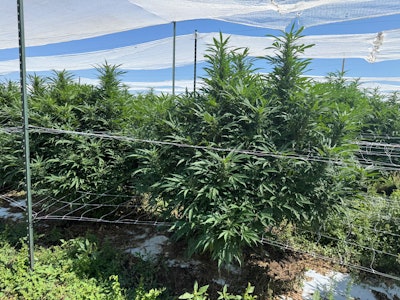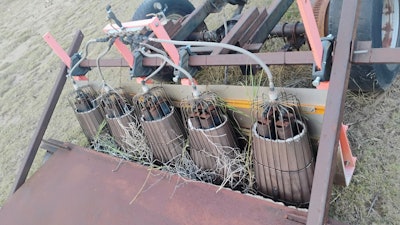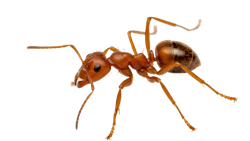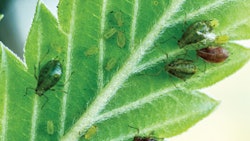
Mason Walker is stressed out. With the already intense pressures of running his cannabis farm in Oregon, he’s facing another challenge this season: more aphids threatening to chew up his plants at East Fork Cultivars.
“This year, I’d say we’re facing a problem with 50 percent more aphids than last year,” he says, “and the conditions this summer in Southern Oregon have let them thrive even more.”
Shawn Honaker can relate, but his anxiety stems from the bustling activity of a different kind of pest: grasshoppers. The manager of Yeti Farms in Pueblo, Colo., says his 55-acre outdoor farm is often a buffet for grasshoppers, and he says this year is the worst he has seen them propagate.
“Before our mitigation efforts, if you walked into any area of my farm, within 10 feet you would scare up to 500 grasshoppers,” Honaker says, adding that his farm’s arid region leaves little greenery for grasshoppers to enjoy, making his cannabis plants a prime target for a feast. Grasshoppers also hop his fence with their impressive flying ability. To make matters more challenging, a single insect can lay hundreds of eggs, depending on the species. Mason Walker of East Fork CultivarsPhoto courtesy East Fork Cultivars
Mason Walker of East Fork CultivarsPhoto courtesy East Fork Cultivars
As cannabis and hemp farmers across the U.S. confront surging pest management challenges, experts in the sector shared with Cannabis Business Times several approaches to stem the tide of those pesky bugs and the serious damage they can do to cannabis and hemp crops.
From aphids to spider mites to grasshoppers to whiteflies, these pests aren’t going anywhere any time soon, but cannabis companies can be proactive to ensure their plants stay healthy.
The Benefits of Going Biological
Walker isn’t sitting on his hands this fall, and he’ll follow through on what he experimented with during the chaotic aphid season last year. His farm worked with Oregon State University to raise its own parasitic wasps and released them into the fields to push away the aphid storm. “This was seemingly effective at limiting aphid activity and damage, and we’ll do the same this year,” Walker says.
Honaker is battling his pest trouble with a similar approach. For the past few years, he’s introduced guinea fowl onto his field to help them drive out not just insects but also rodents and snakes.
Raymond Cloyd, a professor of entomology at Kansas State University, applauds what Walker and Honaker are doing to combat their pest problems. “When you’ve got a crop that's going to be inhaled or used commercially, … biocontrol is a great option,” he says.
When Cloyd consults with cannabis companies to help them with their insect infiltrations, he suggests battling mites with other mites. “With one company, we introduced predatory mites to fight off mites, and that proactive solution proved to be very successful,” he recalls.
There are also types of predatory mites that can stave off thrips, whiteflies and aphids, he adds. A view of Yeti Farms in Pueblo, Colo., where grasshoppers are an increasing threat to plants.Photo courtesy Yeti Farms
A view of Yeti Farms in Pueblo, Colo., where grasshoppers are an increasing threat to plants.Photo courtesy Yeti Farms
Monitoring and Sanitation Are Crucial
Taking an anticipatory approach to pest management also requires careful monitoring of your plants, whether hemp or cannabis, Cloyd says.
Growers can use visual monitoring methods such as placing sticky yellow cards above the crop canopy, which can commonly catch whiteflies and similar bugs.
But don’t forget the beat method, he advises. Growers should place a white piece of paper attached to a clipboard under their plants and then shake the stem and let the bugs fall on the paper. Mites, thrips and aphids are commonly found with this method, he says.
“This approach has to be done at least once or twice a week because you need to detect those populations early in order to spread out your biological control agents,” Cloyd says.
What About Hemp?
Cultivators of all species of Cannabis sativa L. face pressures to keep their plants insect-free, including hemp growers, says Marguerite Bolt, the hemp extension specialist at Purdue University.
The challenges, however, can vary by region, Bolt says. In western states, for example, the beet leaf hopper is an increasingly problematic pest due to how it’s the vector of the beet curly top virus. Industrial hemp growers in some dry, western states are experiencing grasshoppers chewing up plants at a high rate. In the Great Lakes region, growers see caterpillar pests, including corn earworm and yellow-striped armyworm, which feed on the female flowers and in the grain heads.
Monitoring hemp plants is also integral for hemp growers, Bolt explains. “I recommend growers spend time with their plants throughout the season and make notes on what damage is occurring and when,” she says. “Certain pests are going to be difficult to manage, so strategies like altering planting or harvest dates, selecting tolerant and resistant cultivars, sanitation practices, and the use of registered pesticides may be necessary.”
Learning as much as you can about the pests that are increasingly invading your crops can also help, Bolt says. She adds, “Some pests, especially foliar feeding beetles, cause some ugly damage, but if plants are larger, they can withstand a lot.” Yeti Farms' Shawn Honaker uses a propane-fired weed burner, resembling a Bush Hog mower, attached to the back of a pickup truck, he says, “but instead of blades, we use propane flames that penetrate the soil and destroy as many grasshopper eggs as we can."Photo courtesy Yeti Farms
Yeti Farms' Shawn Honaker uses a propane-fired weed burner, resembling a Bush Hog mower, attached to the back of a pickup truck, he says, “but instead of blades, we use propane flames that penetrate the soil and destroy as many grasshopper eggs as we can."Photo courtesy Yeti Farms
Cloyd highlights an issue for hybrid growers who manage both hemp and other commercial crops. “For outdoor hemp growers that have hemp close to corn or soybean fields, during harvest the hemp will be more susceptible to insects moving in, such as the corn earworm.” (The corn earworm is a common pest of corn, as well as tomatoes and several other crops, according to Purdue University’s Entomology Extension.) “That’s why you have to get proactive,” says Cloyd.
For a more extreme solution to stave off invasive pests, growers can fight fire with … well, fire. Honaker uses a propane-fired weed burner, resembling a Bush Hog mower, attached to the back of a pickup truck, “but instead of blades,” he says, “we use propane flames that penetrate the soil and destroy as many grasshopper eggs as we can. That’s what we call our organic weed killer.”
David Silverberg is a freelance journalist who writes about cannabis and the cannabis industry.


























